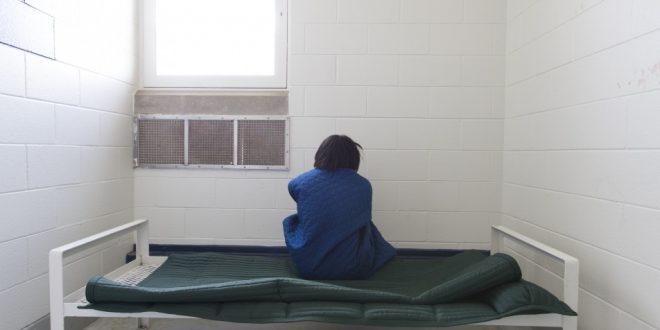Podcast: Play in new window | Download (Duration: 14:54 — 13.7MB)
The three largest providers of mental health care in America aren’t in hospitals, they’re in jails. According to a 2017 report from the U.S. Department of Justice, about 37 percent of people in prison have a history of mental health problems. More than 24 percent have been previously diagnosed with major depressive disorder, 17 percent with bipolar disorder, 13 percent with a personality disorder, and 12 percent with post-traumatic stress disorder. The sad thing is that the numbers are even higher for people in jail, where one-third have been previously diagnosed with major depressive disorder and almost one-quarter with bipolar disorder.
Alisa Roth is a mental health correspondent for Minnesota Public Radio and author of Insane: America’s Criminal Treatment of Mental Illness where she explored prisons all over the country and explains what she saw with the mental health patients there.
In 2018, Roth spoke in an interview on National Public Radio (NPR) for an episode about mental illness in prisons. In the interview, she explained many of the issues that she saw in the prisons, including recognition of mental health in prisoners, punishment, and law enforcement.
According to Roth, once people who are mentally ill go behind bars, they can go long periods without any medication. In the jail systems, Roth said, “Half of the people in our jails have a mental illness.” However, she remarks that the statistics in the criminal justice system are very poor and the definition of mental illness is not often clear.
In relation to mental health issues that arise when people aren’t given the correct amount of medicine or any medicine in some cases, this can lead to violence and intense punishment for the prisoners. Ross explains that the training for a correctional officer is a lot about maintaining control and escalating when prisoners do not comply with their orders. She goes on to explain how this is a whole different scenario for someone mentally ill.
“For a person with a mental illness, particularly one who’s paranoid this is absolutely terrifying, I mean its terrifying for anyone it’s intended to be frightening, but for a person with mental illness it’s incomprehensibly terrifying and so the result is often that the person with mental illness responds in exactly the opposite fashion so by lashing out or fighting back, and so this leads to a cycle of escalation when really what you want to be happening is de-escalation.” She says.
Roth also explains what the punishment is for prisoners who do not correctly obey orders or act out. In extreme cases, prisoners are sent to solitary confinement. Roth speaks on what this does to people with mental health issues.
She explained, “When people can’t follow the rules because they can’t understand them or because their paranoia makes them think that following the rules is going to get them hurt, the punishment is solitary confinement which basically means being shut in a window-less room by yourself 23 hours a day and it can make people who are sane completely mentally ill but for somebody with mental illness, it’s absolutely devastating.”
Roth also describes in other cases when prisoners are caught in a suicide attempt or self-harm saying, “One of the other things that we see often is that someone will try to hurt themselves either an actual suicide attempt or a self suicide attempt and then people will be punished… or they will be punished for state property for tearing a sheet to tie it into a noose.”
In terms of therapy in jails in prisons, Roth argues that there is not enough consistency or privacy for prisoners to get the care that they need, especially for mentally ill prisoners.
She says, “Even more detrimental to the therapy in jails and prisons is the lack of intimacy.. the lack of consistency… it’s not just that you’re yelling through a metal door you’re yelling so that the entire tier can hear what you’re saying.”
When thinking of the issues presented with mental illness in prisons, Roth emphasizes the importance of being aware of the conditions that prisoners endure and overall what goes on in these prisons and jails not just to people with mental illness but everyone.
“I think this is part of the problem that so many of us have no understanding -even though it’s our tax dollars that are funding this. We have no idea what’s going on in these places even in the general population let alone what we’re doing with people who have a mental illness who are in these sorts of jails within the jails.”
***
Jim Baugh is a licensed clinical social worker that works specifically in Monroe and Lawrence County jails with mentally ill patients. He says primarily, the work he does involves suicide risk assessments, mental health check-ups, and informed trauma care, however there is a lot that requires help by Baugh outside these areas. Baugh says, “It’s a variety of things I do but it’s all related to mental health.”
As someone who works with people with mental illnesses and are incarcerated, Baugh explains the process of getting medicine to the inmates.
he explains, “ With respect to mental health it’s a variety of things… if they’re really on medication there’s usually not much of a wait period to get them started again on their medications.”
Baugh also explains issues presented when people need medicine but have been “self-medicating”. This can include more intensive research and assessment before prescribing patients for their needs.
“There are definitely inmates that come in here who are not on medication that have been on medication in the past and may have stopped taking it for several years…” Baugh says. He continues saying, “I have to do a mental health assessment and then I meet with medical staff…”
As a full-time mental health worker in the jail, Baugh explains the amount of help that is needed when working with mental health patients, especially recently as he states, “Jails have become mental health facilities” highlighting the various needs that are required to be met in jails for the people coming in.
“We have a complete medical team here, I’m here full time, we have three full-time nurses… jails have evolved into places now where they require medical attention…a lot of things are going on in jails now.” He says.
As Roth explained in her studies, officer training has been a concern for correctional officers specifically because of the amount of time and detail it takes to give them information on how to deal with patients.
Baugh stated that fortunately there has been an increase in training with mental healthcare in jails. Baugh explains his work that has been done with their orientation program by meeting with the officers on mental health training and mental health first aid.
“They’ve actually increased training. They have what we call now mental health training” he states. “I meet with them and do mental health training as well.”
The funding that was given for the jail systems of Monroe County is much appreciated according to Baugh. He states that the money will help increase nurse practitioners for mental healthcare and “increase safety for both inmates and staff.”
Baugh states, “We’re just all thrilled about this you know Monroe County being very progressive from the commissioners to the county council to the sheriff to the judges, prosecutors to the public offenders, everyone seems to be on board with wanting to do the right thing… we’re making some pretty big steps here at Monroe County Correctional Center.”
When looking at the issue of mental healthcare in jails and prisons today, Baugh explains that education is needed by the public. He says that this issue is viewed residually, where the focus is on the need for helping the people that need help right away, and making sure that improvement can be seen when patients are ready to leave the facilities.
“People need to be educated on what’s going on in jails now, the public needs to be educated. there are people out there who think that it may not be such good use of taxpayers’ money… we make sure that inmates are leaving in a better condition than when they arrived and hopefully, get them pointed in the right direction as far as follow-up services.” Baugh says.
Baugh expresses his thoughts on working with the facilities in Monroe and Lawrence County and working with patients saying, “It’s a great facility to be a part of they all seem to unanimously in getting the help they need.”
He also explains the importance of having programs such as problem-solving courts, and other transitional programs that give people a way to deal with issues such as drug abuse and mental illness. Baugh says that this approach is a great way to gradually transition jail inmates back into society.
He states, “Problem-solving court is an alternative to prison. They have drug courts, mental health courts, veterans courts… our jail commander is very on-board with trying to stay ahead of what’s going on.”
 WFHB Bloomington Community Radio
WFHB Bloomington Community Radio


